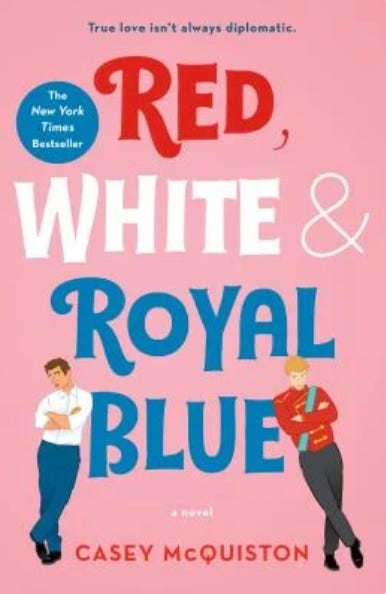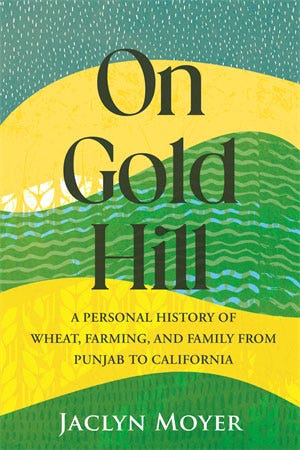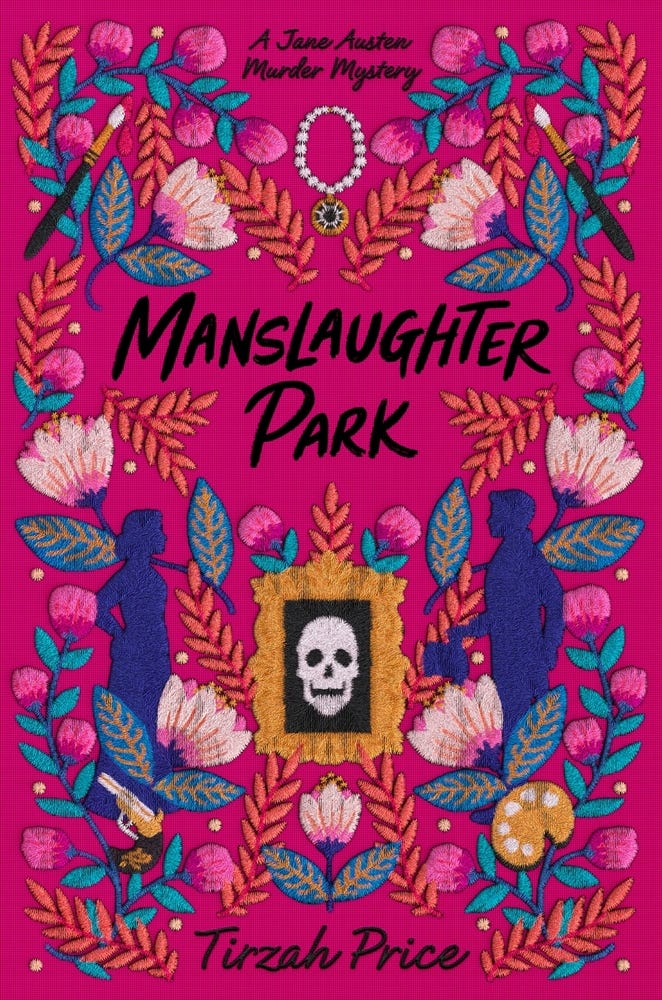Bookworm: June 2025
'Red, White & Royal Blue,' 'Murder at Rough Point,' 'Summer of '69,' 'On Gold Hill,' 'Manslaughter Park'
This post contains an affiliate link or links. If you use a link to buy a book, I may earn a small commission. You can find all the books that have been featured in this newsletter in my Bookshop store.
Happy summer! This year we took our annual family summer vacation early, starting in mid-June. We visited family and friends in Washington, D.C., Rhode Island and Boston. As usual, I prepared for the trip by picking up books set in each destination. Honestly, it’s the best part of packing. More on those below.
Table of contents
Queer romance: “Red, White & Royal Blue,” by Casey McQuiston
Historical mystery: “Murder at Rough Point,” by Alyssa Maxwell
Historical fiction: “Summer of ‘69,” by Elin Hildebrand
Nonfiction/memoir: “On Gold Hill,” by Jaclyn Moyer
Jane Austen retelling: “Manslaughter Park,” by Tirzah Price
“Red, White & Royal Blue”
This much-lauded book was my D.C. selection. Its simple but seductive spin on the enemies-to-lovers trope: What if the son of the U.S. president and the son of the Queen of England, whose roles made them natural rivals, fell for each other?
Author Casey McQuiston makes no bones about this being an escapist fantasy. Alex, from whose viewpoint the story is told, isn’t just the son of the U.S. president. He’s the son of the Democratic, divorced white woman president from Texas who’s running for re-election with the help of her ex-but-still-loyal husband, a Mexican American senator. Alex has dated women, but he also had a high school fling with another boy, which he chalked up to youthful experimentation.
Then Alex accidentally causes an international incident at a royal wedding and is forced to smooth it over by carrying out a highly public friendship with Prince Henry.
McQuiston fills her novel with delightful characters and delicious plot twists. To my surprise, the ending made me a little verklempt. Then I realized that “Red, White & Royal Blue” is not just a romance but also an alternative history in which we have achieved the purpose another president once set in his inaugural address: “to make kinder the face of the Nation and gentler the face of the world.” Be still, my heart.
“Murder at Rough Point: A Gilded Newport Mystery”
For my Rhode Island read, I picked up a title from historical mystery author Alyssa Maxwell’s Gilded Newport series. Gilded as in the Gilded Age, a time of rapid economic growth between the 1870s and 1890s during which families such as the Vanderbilts, Astors, Rockefellers, Carnegies and Morgans ascended to the top of America’s social ladder. Newport as in the coastal Rhode Island town where such families built a row of “summer cottages” that today serve as the American response to Versailles.
These homes include Rough Point, once owned by the tobacco heiress Doris Duke. In Maxwell’s cozy mystery, it becomes the home of one of the Vanderbilts. Her amateur-detective heroine, Emma, is a shirttail Vanderbilt relative with ambitions of becoming a journalist. Thus far, she’s penned a society column and a couple of investigative pieces. Then she lands an assignment that she hopes will truly advance her career. A group of artists has rented Rough Point and she gets permission to embed with them so she can write about their doings.
Naturally, it doesn’t take long before one of the artists winds up dead, having somehow fallen over Newport’s famous cliffs. Emma is soon busy sorting through the remaining artists as possible suspects, including, alas, her own mother and father, newly back in her life after a four-year sojourn in Europe.
Maxwell hits all her marks as a cozy mystery author, but what I liked best about this book was its evocation of time and place. It was a perfect fit for a peaceful stint in the Ocean State.
“Summer of ‘69”
For my Boston/Massachusetts book, I chose a title from Elin Hilderbrand’s summer collection. Don’t be fooled by the California-esque cover: The book actually takes place on the island of Nantucket, south of Cape Cod, and no one goes surfing.
Hilderbrand, a Nantucket resident herself, interlaces the story of a multigenerational Nantucket family’s pivotal summer with real events such as the moon landing, Woodstock and Chappaquiddick. The story unfolds from multiple perspectives: Kate, a 48-year-old mother of four who is enduring the agony of having her only son in Vietnam. Blair, Kate’s oldest daughter, who is sweating through a summer pregnancy while battling doubts about having given up teaching to become a Boston housewife. Kirby, the middle daughter, who is trying out a new identity on the neighboring island of Martha’s Vineyard. Jessie, at 13 the baby of the family, who is grappling with her first summer without any siblings to watch over her.
All of them are hiding secrets of varying significance from one another and from Exalta, aka Nonny, the no-nonsense grandmother and matriarch of the family. It’s only a matter of time before something has to give. The question is, will the family fall apart in the process?
“On Gold Hill: A Personal History of Wheat, Farming, and Family, From Punjab to California”
I first encountered Jaclyn Moyer’s memoir while familiarizing myself with the 2025 Oregon Book Award finalists. I didn’t have time to read the whole book before the awards ceremony, but the excerpt I did read was intriguing, thanks to Moyer’s deft prose.
Then Moyer won the award for creative nonfiction. I requested the book from the library.
Moyer’s memoir focuses on her time operating a small organic farm in California. One of the crops she and her partner grew was wheat. Not just any wheat, but one particular strain in which the two sides of her heritage — from her white California father and her Punjabi American mother — just happen to come together.
When Moyer begins to trace her personal connection to this wheat, she finds herself also tracing the history of the organic agriculture movement in the United States and its connection to a Brit who endeavored to reform agriculture in India. It’s a small world, after all. Then there’s her journey as a child of Asian immigrants, which becomes particularly poignant when it takes her to her grandmother’s childhood village and she meets relatives who are living the life she might have had.
As the best memoirs do, “On Gold Hill” offers an intensely personal story, one that no one else could have written, while also digging deeply into a universal topic, modern agriculture, and connecting the dots to provide new insights.
“Manslaughter Park”
As I re-read (in order of publication!) Jane Austen’s six novels in celebration of her 250th birthday this December, I’m also reading a modern retelling of each novel. After re-reading Austen’s third novel, “Mansfield Park,” last month, I felt especially in need of a fresh take.
I find Fanny Price, the heroine of “Mansfield Park,” harder to like than her sister protagonists. Like Jane Bennet and Elinor Dashwood, she is all about propriety, but she lacks Jane’s sweetness or Elinor’s stateliness. She has a tendency to shrink back, even cower, in sharp contrast to Elizabeth Bennet’s vivacity and Marianne Dashwood’s recklessness. And she is hopelessly in love with her first cousin (ick), not because he swooped to her rescue or proved to be her intellectual match, but because he’s been nice to her. When a dashing brother and sister arrive at Mansfield Park and both take an interest in her, she reacts not with curiosity but with condemnation and terror, because the brother is (gasp) an incorrigible flirt. I knew that I ought to like and admire Fanny, but she was so unflaggingly virtuous from start to finish that I’d probably find her unbearable in real life.
Thankfully, we have mystery author Tirzah Price to give Fanny a glow-up.
In “Manslaughter Park,” part of Price’s Jane Austen Murder Mystery series, Fanny gets to be the complicated heroine of a cozy mystery. Price transforms her from a hand-wringing charity case, fearful of the uncle whose generosity she depends on, into a brush-wielding artist, encouraged by said uncle to explore her talent. Edmund is no longer an incestuous crush but a fellow shirt-tale relative who shares no DNA with Fanny. And when those dashing siblings arrive, she is fascinated by her own response to them. (Hint: Price’s retelling of “Mansfield Park” includes queering it.)
I enjoyed “Manslaughter Park” so much that I looked up Price’s work and was pleased to learn that she’s also re-told Austen’s first two novels. Lucky us!
Happy reading!






